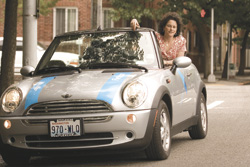“I read an article in Time magazine about Flexcar seven years ago,” JAMIE CHENEY says. “I called them up, but they didn’t have any open jobs. I asked if they were selling to businesses. ‘Not yet, but we’re thinking about it,’ they told me. I told them I was the person to get that going.”
Today, Cheney is the general manager of Seattle’s Flexcar operation, and also among the longest tenured employees at the young, for-profit company (which started in Seattle in 2000). Before that, she co-founded a medical second-opinion consulting firm, but left that behind when she saw an opportunity to join an “interesting, solution-oriented” employer. “People in the health-care industry just aren’t happy,” Cheney says. It’s a world where “people don’t like paying their bills.” By contrast, she says, “one day here at Flexcar, I opened a remittance and the person had written ‘I love Flexcar’ on the slip.” Take that, Blue Cross.
Not only is Cheney happy with her job, she loves selling the Flexcar story. “There is a certain freedom that comes with car sharing—the freedom to choose from a variety of cars or to get rid of cars. We spend an average of $700 a month on our personal cars. Who couldn’t use an extra $700?” For her own transportation purposes, Cheney alternates between a Toyota Prius, the bus, and Flexcar. She says the company vehicles are “better maintained and serviced than my own car. They have cooler cars than I do, like Mini Coopers and convertibles. With a Flexcar, you don’t have to pay for parking. I’m proud to drive a Flexcar, to be seen in something with that Flexcar sticker on the side.”
And while car sharing with strangers who have unknown hygienic practices may give some people pause, for Cheney it couldn’t be better. “Flexcars are cleaner than my car,” she says. “I have kids, so mine is filled with Cheerios and diapers.





